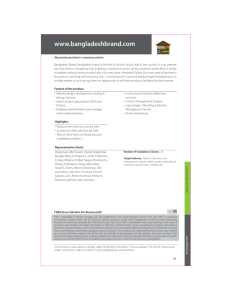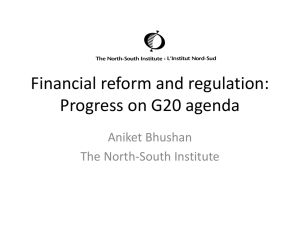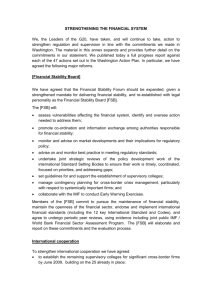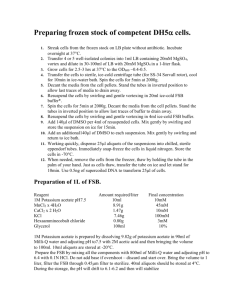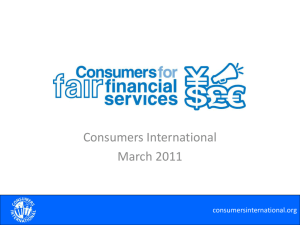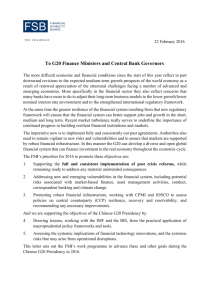To G20 Finance Ministers and Central Bank Governors
advertisement
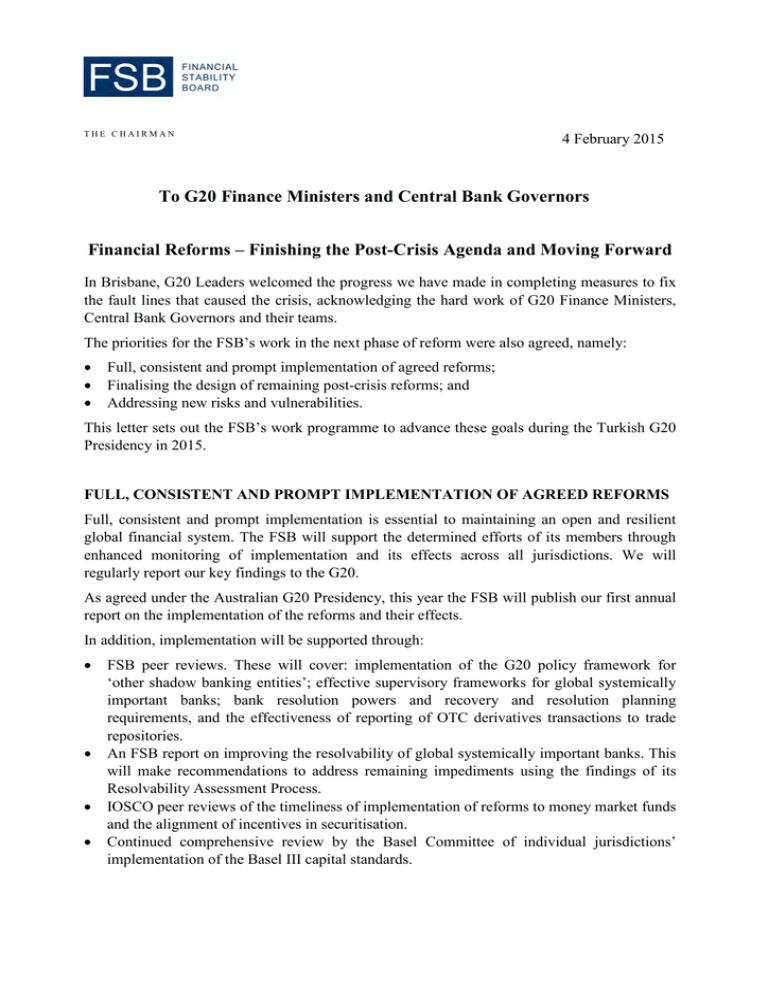
THE CHAIRMAN 4 February 2015 To G20 Finance Ministers and Central Bank Governors Financial Reforms – Finishing the Post-Crisis Agenda and Moving Forward In Brisbane, G20 Leaders welcomed the progress we have made in completing measures to fix the fault lines that caused the crisis, acknowledging the hard work of G20 Finance Ministers, Central Bank Governors and their teams. The priorities for the FSB’s work in the next phase of reform were also agreed, namely: • • • Full, consistent and prompt implementation of agreed reforms; Finalising the design of remaining post-crisis reforms; and Addressing new risks and vulnerabilities. This letter sets out the FSB’s work programme to advance these goals during the Turkish G20 Presidency in 2015. FULL, CONSISTENT AND PROMPT IMPLEMENTATION OF AGREED REFORMS Full, consistent and prompt implementation is essential to maintaining an open and resilient global financial system. The FSB will support the determined efforts of its members through enhanced monitoring of implementation and its effects across all jurisdictions. We will regularly report our key findings to the G20. As agreed under the Australian G20 Presidency, this year the FSB will publish our first annual report on the implementation of the reforms and their effects. In addition, implementation will be supported through: • • • • FSB peer reviews. These will cover: implementation of the G20 policy framework for ‘other shadow banking entities’; effective supervisory frameworks for global systemically important banks; bank resolution powers and recovery and resolution planning requirements, and the effectiveness of reporting of OTC derivatives transactions to trade repositories. An FSB report on improving the resolvability of global systemically important banks. This will make recommendations to address remaining impediments using the findings of its Resolvability Assessment Process. IOSCO peer reviews of the timeliness of implementation of reforms to money market funds and the alignment of incentives in securitisation. Continued comprehensive review by the Basel Committee of individual jurisdictions’ implementation of the Basel III capital standards. The FSB will highlight concisely to the G20 good practices, shortcomings and any unintended effects and implementation challenges of reforms. This work will include a specific analysis of the effects of reforms in emerging markets. The ongoing commitment of Ministers and Governors is needed to ensure that gaps and inconsistencies in implementation are corrected and, where any material unintended impacts have been identified, policies are adjusted. Particular focus is required on the slow and uneven implementation of agreed reforms to OTC derivative markets. These reforms include reporting of trades to trade repositories and, for standardised transactions, central clearing and organised platform trading. The charts below show the status of implementation as reported to G20 Leaders in Brisbane. (Importantly, although this chart shows that most jurisdictions have trade reporting rules in place, authorities continue to report challenges regarding the access to and usability of data held by trade repositories.) Implementation of OTC derivatives reforms As per cent of number of FSB jurisdictions As per cent of market size1 Reporting Reporting Clearing Clearing Trading Trading Margin Margin 0 20 40 60 80 100 0 Final regulations fully/partially effective Implementing regulations fully/partially adopted but not effective, or in consultation/proposed Draft implementing regulations not yet published (dark red colour indicates that deadline for reform has lapsed) 20 40 60 80 100 1 Market size based on single currency interest rate derivatives gross turnover in April 2013 (BIS 2013 Triennial Survey). Further progress is also required to ensure cross-border consistency and effectiveness of rulemaking. The OTC Derivatives Regulators Group will address cross-border implementation issues that were identified in their report to the Brisbane Summit. And the FSB will continue to promote appropriate use of deference in the cross-border application of derivatives regulations in line with the G20 Leaders’ St. Petersburg Declaration. We will also continue to consider whether and where more widespread adoption of flexible outcomes-based approaches to resolving cross-border regulatory issues can be used. FINALISING THE REMAINING POST-CRISIS REFORMS Further work on the design of reforms is needed in three areas: completion of the capital framework for banks; measures to help end too big to fail; and initiatives to make derivatives markets safer. 2 Completion of the capital framework for banks Although much of the capital framework is complete and large internationally active banks are on course to meet the new Basel III capital ratios almost four years in advance of the deadline, the consistency and comparability of capital ratios must be improved. By the Antalya Summit, the Basel Committee will: • • Conduct public consultations and quantitative impact assessments to enhance the Basel framework standardised approaches for calculating risk-weighted assets, to be finalised in 2016. Publish measures that address excessive variability in internal-model based approaches to Basel III. In addition, the Basel Committee will continue to work towards agreement of the appropriate standard for the leverage ratio, to be finalised by 2017 at the latest. Ending too-big-to-fail At the Brisbane Summit, two crucial elements of the policy framework to end too-big-to-fail were agreed: a proposal for a common international standard on the total loss-absorbing capacity that globally systemic banks must have; and an industry agreement that will prevent cross-border derivative contracts from being terminated disruptively in the event of a globally systemic bank entering resolution. In 2015, we must bring this progress to finalisation. By the Antalya Summit: • • The FSB will finalise the international standard for total loss-absorbing capacity of global systemically important banks. FSB members will take measures to promote industry adoption of contractual provisions recognising temporary stays on the close-out of financial contracts when a firm enters resolution. At the same time, progress must be made towards addressing the too big to fail problem in financial institutions other than banks, including insurers, finance companies, market intermediaries, investment funds and critical market infrastructure. For example, while the use of CCPs for standardised OTC derivatives transactions is reducing systemic risks, we must ensure that CCPs themselves are not too big to fail. Work on methodologies to identify non-bank, non-insurer global systemically important institutions is progressing and, by the Antalya Summit: • • The FSB will review progress towards implementation of resolution regimes and resolution planning requirements for central counterparties that are systemic across multiple jurisdictions and will assess the adequacy of CCPs’ loss absorbing capacity in resolution. The International Association of Insurance Supervisors (IAIS) will finalise higher loss absorbency requirements for global systemically important insurers. Making derivatives markets safer In addition to ensuring the recoverability and resolvability of CCPs, authorities will need to coordinate oversight of CCPs and their main clearing members. To support this, the FSB will work with CPMI and IOSCO to develop a coordinated work plan. 3 With the support of the G20, FSB members have made major investments to reduce the opacity of OTC derivative markets. We now need to make trade reporting truly effective. There currently are significant legal and other blockages to the reporting, sharing and aggregation of key information regarding trades and these must be removed. In some jurisdictions, ministerial action may be required to ensure their removal. By the Antalya Summit: • • • The FSB will identify the legal barriers in member jurisdictions to reporting of counterparty information to trade repositories and set a deadline for jurisdictions to address them. CPMI and IOSCO will propose for consultation guidance on the design of a global Unique Transaction Identifier and Unique Product Identifier to aid consistent trade reporting. IOSCO will finalise the measures in its proposed cross-border regulatory toolkit. These will be applicable not only for OTC derivatives but also for other market regulation. ADDRESSING NEW RISKS AND VULNERABILITIES Building an open, global financial system that can support strong, sustainable, balanced growth will require more than fixing the fault lines that caused the crisis. The FSB must also address constantly evolving risks and vulnerabilities in the global system. In general, closing data gaps and sharing analysis and policy choices will be vital to allow national authorities to understand and react to risks effectively and promptly. In addition, the FSB will focus on co-ordinating efforts to address two specific emerging vulnerabilities: market-based finance and misconduct. Risks stemming from market-based finance Divergent growth and policy paths in the global economy have led to some increase in financial market volatility from extremely low levels. Nevertheless, the ongoing disconnect between risk-taking in financial markets and developments in real economies poses the threat of sharp adjustments in financial market prices at some point, possibly triggered by a range of geopolitical risks or the expectation that monetary policy is likely to begin to normalise in the United States. There is a growing concern that current prices of some securities are based on optimistic assumptions about the likely liquidity of those assets in the event of a market correction. Although liquidity has become scarcer as banks have reduced the scale of their trading books, investors are assuming any future sales can be performed in an environment of continuous market liquidity. Such ‘liquidity illusion’ has been reinforced by the growth of assets held in investment funds committed to offering redemptions at very short notice. The macroprudential risk is that a correction to this liquidity illusion could generate sharp changes in asset allocation. With net credit creation being largely reliant on bond finance and emerging markets tripling annual issuance of international bonds since the crisis, such a reallocation could generate a pronounced tightening of real economy credit conditions. Against this background, the FSB will prioritise work to understand and respond to vulnerabilities in capital market and asset management activities. It will examine the policy tools that could be applied to asset managers according to the activities they undertake with the aim of mitigating the systemic risk of fire sales and potential collapse of market liquidity. 4 In addition, and in accordance with the Shadow Banking Roadmap endorsed by Leaders in Brisbane, the FSB will: • • • Address data gaps that limit our understanding of evolving risks so that, where needed, we can promptly address risks through well-designed, coordinated policies. We will commence comprehensive information sharing under the policy framework for other shadow banking entities and address data gaps in the areas that inhibit regulatory cooperation. Finalise the remaining elements of our regulatory framework for haircuts on securities financing transactions and set out details for monitoring implementation. Complete the development of standards and processes for global securities financing data collection and aggregation, and set a timeline for implementation. Conduct risks The scale of misconduct in some financial institutions has risen to a level that has the potential to create systemic risks. Fundamentally, it threatens to undermine trust in financial institutions and markets, thereby limiting some of the hard-won benefits of the initial reforms. Recent experience suggests that the implications could be far-reaching, including withdrawal from correspondent banking facilities, which reduces financial inclusion. Enforcement must remain a credible deterrent to misconduct and the FSB will consider the extent to which enhanced co-operation between conduct supervisors and greater consistency in the application of conduct regulations across jurisdictions can improve its effectiveness. We will also examine the extent of withdrawal of correspondent banking facilities and possible remedies. In addition, the FSB will consider reforms to reduce the likelihood of misconduct, including by: • • Assessing reforms to risk governance, compensation structures and benchmarks and, where appropriate, proposing additional measures in these areas. Considering ways to improve market structure, standards of practice and incentives for good conduct in financial markets more broadly. This full and challenging agenda is necessary to building a global financial system that is not just safe, simple and fair, but also diverse, trusted and open. I am confident that we can deliver on it and that, by doing so, we will continue to further the G20’s objective of strong, sustainable and balanced growth for all countries. Yours sincerely, Mark Carney 5


